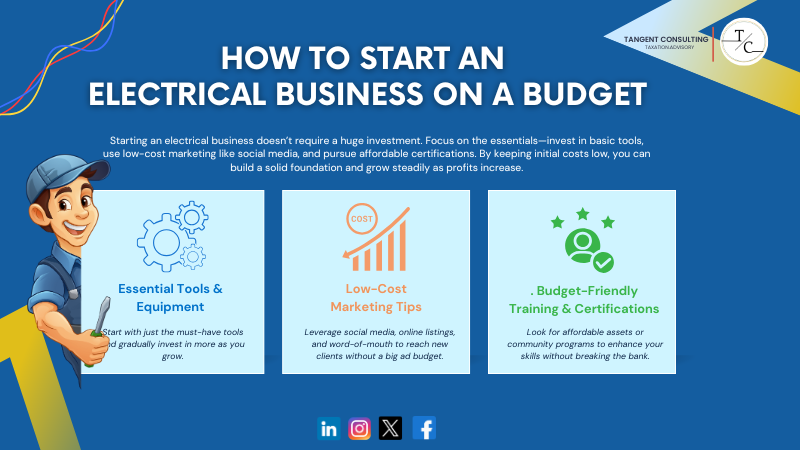How To Start Electrical Business on a Budget?
How To Start Electrical Business on a Budget?

Another day of hard labor has passed, and as you sit down, maybe with coffee in hand, a thought crosses your mind: “What if I can start my own business?”
But then other thoughts about where to start, costs, and how to compete with your peers’ flood in.
It’s ok if you can’t relate to the story, but if you are someone who’s looking to answer the question, “How to start electrical business?” then this guide is for you. In addition, it’s not just about starting; it’s about starting on a budget.
So, let’s break it down.

How To Start Electrical Business?
“You don’t have to be a genius or a visionary, or even a college graduate to be successful. You just need a framework and a dream.” – Michael Dell, founder of Dell Technologies.
As Dell describes, vision and a strategic framework can take you a long way. However, among the biggest challenges most small business owners face is raising funds to fund that vision. After all, an estimated 65% of small businesses begin with less than $10,000 in starting capital.
But we don’t have to get discouraged. Instead, we can take this as a positive statistic, as many successful entrepreneurs have started off with minimal resources, kept their eyes on clear goals, used smart budgeting, and had a strong work ethic.
In the sections ahead, we’ll break down practical, budget-friendly steps to get your business running, laying a foundation that aligns with your vision and the resources you have.

1. Get Required Licensing
When starting an electrical business, the first step is obtaining the proper licenses. Without the right licensing, you could face hefty fines, legal troubles, or even a shutdown of your operations before you even begin.
While requirements vary by location, most regions in the US and Canada require electricians to have a general contractor’s license and specific certifications.
If you are from the US, you can check NECA’s website to check the certifications required for your region.
Electricians may need to pass exams, meet educational requirements, and log a certain number of on-the-job hours before applying for a business license.
We know it can be daunting if you are looking to start an electrical business, but licensed pros are more trustworthy.
Although it may require an upfront cost, it’s an essential part of building a reputation that will allow your business to stand out.

2. Get Registered
Once you’ve secured the necessary licenses, the next essential step is to register your business. Registration gives your business an official identity, which adds legal protection and credibility to your business.
To get started, decide on a business structure such as a sole proprietorship, partnership, LLC, or corporation. Each structure has its own benefits, so you can check it out here and decide which suits your needs.
It can be time-consuming to decide which structure is best for you; however, once you have gotten over it, it future-proofs your electrical business and builds a solid foundation.
3. Create an Electrical Business Plan
A business without a plan is like wiring without a blueprint—disorganized, risky, and bound to fail.
A business plan not only guides the business but also gives the sense of measurable goals and describes the target market, and you can anticipate what’s coming your way. Research shows that businesses with a formal plan grow 30% faster.
Your business plan should cover key areas, including services, target market, pricing structure, and marketing strategies. Additionally, be sure to outline a budget that reflects your starting capital and expected expenses.
Remember, a well-thought-out business plan isn’t just for you; it’s also for potential investors and clients. Showing that you have a clear roadmap can enhance trust and make it easier to secure funding, partnerships, and larger projects.

4. Research Market
Before jumping into the field, it’s crucial to understand who your ideal customers are and where you fit within the competitive landscape.
You need to conduct market analysis to identify demand in your area, pinpoint underserved segments, and evaluate what your competitors are doing right and where they fall short.
Start by examining the local landscape. Are there particular neighborhoods or industries experiencing growth? Is there a shortage of residential, commercial, or industrial electricians in your area?
Additionally, you can consider conducting surveys or interviews with potential clients or connecting with other small business owners to gather useful insights.
This research will help you carve out a niche and guide your marketing strategy, helping you appeal directly to the people who can become loyal clients.

5. Get Funding
Launching an electrical business requires an initial investment, even if you’re starting on a budget. Securing funding can help cover essential costs like licensing, equipment, insurance, and marketing.
You can start by assessing how much funding you’ll need to get your business up and running. Create a detailed list of expenses, including tools, vehicle costs, office setup, and working capital to sustain you in the first few months. Once you have a figure in mind, explore different funding options.
You can look for traditional bank loans and Small Business Administration (SBA) loans. Alternatively, if you don’t want to take debt, consider bootstrapping, personal savings, or even reaching out to friends and family for small investments.
In addition, you can look for crowdfunding platforms or grants for small businesses.
6. Set up Costs
One of the biggest challenges in starting an electrical business on a budget is managing initial setup costs. However, by prioritizing essentials and considering cost-effective options, you can set up costs for electrical services.
Start with a list of essentials. Core tools—such as wire cutters, pliers, voltage testers, and multimeters—are non-negotiable. We’ll talk more about the essential tools in a while.
You may also need a vehicle to transport tools and equipment, which can be one of the more significant costs. To keep costs manageable, consider buying quality secondhand tools or leasing a vehicle until you’re ready to invest in your own.
Additionally, factor in the cost of software for managing invoices, scheduling, and client communication. Speaking of software, a must-have tool for electrical business is Jobber. It can help you manage projects, automate invoices, manage clients, and so much more. You can check out our detailed Jobber guide here.

7. Get Business Accounting
Did you know 82% of small businesses fail due to cash flow problems? Poor financial management is one of the main reasons many small businesses fail.
That’s why good accounting practices are the backbone of any successful business, and managing finances from day one is critical for a new electrical business.
You can start by choosing reliable accounting software like QuickBooks, Xero, and FreshBooks. They offer budget-friendly plans with features to help small business owners handle invoicing, expense tracking, and tax preparation.
Pro Tip: Even if you’re starting small, it’s essential to keep personal and business finances separate by opening a dedicated business bank account.
If you are looking to open a new business account, we have partnered with Ramp to give you free $500 on a business bank card. You can learn more about it here.
If managing finances isn’t your strength, you can also consider hiring an accountant or outsourcing your bookkeeping, even on a part-time basis.
8. Promote Your Business
With your electrical business officially set up, it’s time to spread the word. Effective promotion is key to reaching potential clients, building a reputation, and establishing a steady stream of projects.
You can start by creating a professional website and setting up profiles on Facebook, Instagram, or LinkedIn for local outreach. You can talk about your services, post client testimonials, and share project work to build trust and connect with potential customers.
Oh, and don’t forget local marketing strategies like networking with other small business owners, attending trade shows, and listing your services in local business directories.

9. Get Electrical Tools and Equipment
Your tools are more than just an investment—they’re the backbone of your business. You can begin with the basics, like
- Wire Cutters
- Voltage Testers
- Pliers
- Multimeters
As we mentioned earlier, if you’re on a budget, you can consider purchasing refurbished tools or looking for high-quality used options. Once your business grows, you can invest in more advanced tools.

10. Hire Electrical Contractors
As your business grows, you’ll likely reach a point where you can’t do everything on your own. Hiring skilled electrical contractors can help you take on more projects, maintain high-quality work, and meet deadlines consistently.
When hiring, look for contractors with the right qualifications and experience. This ensures they understand safety protocols, local codes, and how to deliver quality work. A budget-friendly option is to hire part-time contractors.
Final Thoughts
We hope we have answered the question of how to start electrical business on a budget. We know it may seem like a tall order, but with the right planning, it’s completely doable.
Isn’t it good if you hire someone to carry your load? We help people like you get a good night’s sleep by taking care of finances. We provide fractional CFO, taxation, and bookkeeping services to help you stay organized and gain an edge over your competitors.
FAQs
How much do electricians make?
In the US, an average electrician makes around $28.89.
What are the three types of electrical work?
The three types of electricians include apprentices, journeymen, and master electricians.
